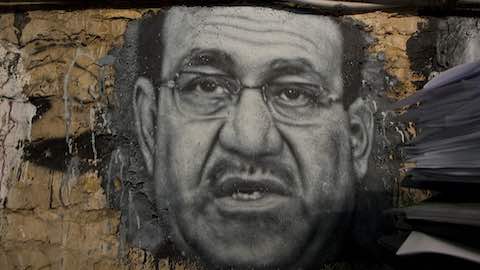- MENU
- HOME
- SEARCH
- WORLD
- MAIN
- AFRICA
- ASIA
- BALKANS
- EUROPE
- LATIN AMERICA
- MIDDLE EAST
- United Kingdom
- United States
- Argentina
- Australia
- Austria
- Benelux
- Brazil
- Canada
- China
- France
- Germany
- Greece
- Hungary
- India
- Indonesia
- Ireland
- Israel
- Italy
- Japan
- Korea
- Mexico
- New Zealand
- Pakistan
- Philippines
- Poland
- Russia
- South Africa
- Spain
- Taiwan
- Turkey
- USA
- BUSINESS
- WEALTH
- STOCKS
- TECH
- HEALTH
- LIFESTYLE
- ENTERTAINMENT
- SPORTS
- RSS
- iHaveNet.com: Middle East

Iraq's Future as a State
By Russ Wellen
Iraqi civilians will no longer stand for a government that fails to provide security and basic services.
Former Prime Minister Nouri al-Maliki leads an obstructionist parliament.
Hundreds of Iraqi protesters climbed over and tore down the walls surrounding Baghad's infamous Green Zone, once U.S. headquarters, now home to the Iraq government and invaded the parliament. Writes David Gardner for the Financial Times:
The outburst came after parliament had serially thwarted [current Prime Minister Haider al-] Abadi's attempt to assemble a more technocratic government of non-partisan experts in charge of finance, utilities and the oil ministry.
It was:
... an expression of public rage at their purported leaders, whether Shia, Sunni or Kurd, pursuing factional advantage instead of public good, and treating Iraq's institutions as booty in a zero-sum game.
In the tradition of congressional Republicans in the United States:
Among those blocking the prime minister's efforts to reunite Iraq and make it work was [former Prime Minister Nouri al-] Maliki]and his faction of their Shia Islamist Da'wa party, whose sectarian policies had so alienated the Sunni and Kurdish minorities with which Iraq's Shia majority was supposed to share power once US forces left Iraq in 2011.
In fact, Iraq's viability as a state may be in question.
Mr Abadi has made recognisable efforts to reconstruct some sort of national consensus, but the damage done by Mr Maliki's persecution of the Sunni and refusal to work with the Kurds -- which opened Iraq's gates to the Isis jihadi comeback -- may prove to be too great for a state that has been eaten and hollowed out inside.
Article: Courtesy Foreign Policy in Focus.
"Iraq's Future as a State"